#Iran domestic flights
Explore tagged Tumblr posts
Text

Letsvisitpersia Tour & Travel Agency has made it possible for travelers from all around the world to easily book Iran domestic flight tickets and pay for them with their international credit/debit cards or through personal bank account, online.
#Iran flights#Iran flight tickets#Iran domestic flights#book Iran flights#book Iran flights online#letsvisitpersia#iran travel agency#iran travel#letsseepersia#Iran airlines#Iranian airlines
1 note
·
View note
Text
The spectacularly rapid fall of Syria’s Bashar al-Assad and his regime is the Middle East’s 1989. Like the fall of the Berlin Wall, this weekend’s end of 54 years of Assad family rule signals an earthquake in the regional order—with tremors that will be felt for decades to come. Just as 1989 was marked by a series of falling dominoes in Poland, Hungary, East Germany, and elsewhere, the collapse of the Syrian regime is part of a chain of events, including Israel’s decimation of Hezbollah, Iran’s loss of its most potent proxy forces, and the weakening of Russia due to the war it started in Ukraine.
And just as 1989 marked the end of communism in Europe, Assad’s flight to Moscow signals the demise of the ideology of anti-Western, anti-Israel resistance in the Middle East. For more than half a century, the Assad family was the backbone for a political order in the Middle East in which a bloc of states styled themselves as the resistance to what they labeled Western imperialism and Zionism. The appropriation of the Israeli-Palestinian conflict proved to be a powerful tool to mobilize the masses across the region who wanted justice for Palestinians—sentiments that the Syrian regime and its allies instrumentalized to distract from their domestic failures, oppress their own people, and extend their regimes’ regional influence. In reality, these regimes cared little about the Palestinians.
Within this bloc, Syria and Iran believed they had entered a mutually beneficial and durable alliance—and each thought it had the upper hand. Syria was crucial for Iran because it was the heart of the land bridge between Iran and its most valuable proxy, Hezbollah in Lebanon, while Syria saw alignment with Iran as increasing its own stature against Israel and bolstering its influence over Lebanon.
For Iran, the ideology of resistance was an indispensable tool to rally support from Arabs and Sunnis as Tehran vied for dominance in the Middle East. As the leaders of a self-styled Axis of Resistance, the clerics in Tehran were able to supplant the old ideology of pan-Arab nationalism, as espoused by the Syrian Baath Party and others, and ultimately dominate several Arab countries through well-armed proxies. The Assad regime ignored this challenge even as Iran manipulated the Baath Party to serve Tehran’s own objective of achieving regional dominance. For example, Iran presented Hezbollah to Syria as an ally when Hezbollah’s primary purpose was to support exporting the Islamic revolution.
The Syrian uprising of 2011 and the war that followed shifted the balance of power toward Iran, which intervened to prop up the Assad regime. Most consequentially, Tehran summoned Hezbollah to support the Assad regime against the Syrian rebels.
In the course of the Syrian war, the country moved from being a partner to a client of Iran. A much-diminished Assad regime was now dependent for its survival on Iran and its proxies, including Hezbollah and Tehran-controlled militias from various countries. In other Middle Eastern states, including Iraq, Lebanon, and Yemen, Iran’s proxies consolidated their status as dominant political and military actors. Iran increased its investment in them as its outer lines of defense and tools of geopolitical influence.
Iran’s rise and dominance as a regional power came to define an entire era of Middle Eastern politics. Across the region, most countries either were under direct Iranian influence via the country’s proxies or were forced to configure their foreign policies around the threats posed by Iran. The Gulf Arab states, for example, ended up pursuing de-escalation with Iran to stave off the instability caused by its activities.
The United States, other Western countries, and Israel did not like this Iran-dominated order, but they tolerated it. They saw it as lower risk compared with the unknown forces that sudden political change in Iran or Syria could unleash. This Cold War-like arrangement with a confrontational status quo made Damascus and Tehran feel confident in their power vis-à-vis the West and its allies.
U.S. disengagement from the Middle East under the Obama administration paved the way for Russia to insert itself into the regional order. When Iran and its proxies showed themselves unable to prop up the Assad regime on their own, Moscow saw the Syrian war as a low-cost opportunity to reclaim its status as a global power and arbiter of the region. Russia’s substantial naval and air bases in Syria also served as critical logistical centers for Moscow’s expanding military operations in Africa.
For almost a decade, Russia thus became a major actor in the Middle Eastern cold war. Russia, Iran, and the rest of the Axis of Resistance appeared to form one bloc, while Western allies such as Israel and the Gulf Arab countries formed another. But Russian support for Assad was little more than a transactional partnership, and Russian-Iranian relations were never frictionless. From the beginning of Russia’s military intervention in Syria, it sought to undermine Iran’s influence in the country so that Russia remained the dominant actor.
The Iranian regime, in turn, was concerned about the challenge that Russia presented to its influence in Syria. Yet Tehran had no choice but to remain in Moscow’s orbit, regarding its influence over Syria as a small price to pay in return for gaining a powerful backer for its Axis of Resistance.
Tehran presented Hezbollah and the Assad regime to the Iranian people as a worthy investment: the front line of resistance to Israel and the crown jewels of Iran’s regional clout. Tehran needed to reassure Iranians that the economic sacrifices and political isolation that its support for Hezbollah and Assad generated were not in vain. Otherwise, Tehran argued, Iran would be under threat of erasure by Israel and the United States.
The collapse of the Assad regime has jolted this dynamic to an abrupt stop. Russia’s abandonment of Assad—and by extension, Iran’s project in Syria—creates additional rifts in Iran’s already shrinking network of proxies. The Iranian leadership will struggle to justify to its people decades of investment in Syria that have gone down the drain in a matter of days.
Standing alone without Syria and Russia in the face of a still-strong Western-backed bloc, the regime in Tehran will be revealed to its people as having imposed a futile sacrifice that not even its nuclear program can redeem. This poses a serious risk to the survival of the Islamic Republic—potentially the biggest fallout of last week’s events.
The repercussions of Assad’s collapse will also ripple across Lebanon, Iraq, and Yemen as Iran’s proxies find themselves without an important lifeline. In Lebanon, in particular, the political dynamics set off by Israel’s decimation of Hezbollah are likely to accelerate with the loss of the all-important land bridge for weapons supplies from Iran. The sudden vulnerability of an already weakened Iran also means that Tehran’s remaining proxies may doubt the reliability of their patron.
The domino effect of the collapse of the Assad regime will inevitably mean the end of the Iran-dominated regional order. Replacing it will be a regional order dominated by Israel and its partners. Israel has shifted its perspective from an uneasy tolerance of Iran’s influence in the Middle East to actively seeking an end to this status quo and has succeeded in practically neutralizing the biggest threat to its security, Iran. Israel will move from being a state surrounded by adversaries and clawing at regional legitimacy to becoming the Middle East’s agenda-setter. Enjoying good relations with both the United States and Russia also makes Israel a key player in ending the cold war in the Middle East.
For the Gulf Arab countries, Iran’s degradation as a destabilizing actor also bolsters the implementation of their economic visions. The defeat of Iran’s revolutionary project will pave the way for widening the scope of normalization between Arab countries and Israel on the basis of shared business, political, and security interests. This recalibration will likely push Turkey to act more pragmatically in the way it engages with the region.
The anti-Western ideology nurtured by the Syrian Baath Party for 54 years and successfully appropriated by Iran blossomed for decades but is rapidly withering. Just as the Cold War ended with the defeat of communism, decades of confrontation in the Middle East will end with the defeat of the resistance ideology.
79 notes
·
View notes
Text



“Name me a single objective we’ve ever set out to accomplish that we’ve failed on. Name me one, in all of our history. Not one!”
-President Joe Biden, August 16, 2023
Joe Biden in one of his now accustomed angry “get off my grass” moods dared the press to find just one of his policies/objectives that has not worked. Silence followed.
Perhaps it was polite to say nothing, given even the media knows almost every enacted Biden policy has failed.
Here is a summation of what he should instead apologize for.
Biden in late summer 2021 sought a 20th anniversary celebration of 9/11 and the 2001 subsequent invasion of Afghanistan. He wished to be the landmark president that yanked everyone out of Afghanistan after 20 years in country. But the result was the greatest military humiliation of the United States since the flight from Vietnam in 1975.
Consider the ripples of Biden’s disaster. U.S. deterrence was crippled worldwide. China, Russia, Iran, and North Korea almost immediately began to bluster or return to their chronic harassment of U.S. and allied ships and planes. We left thousands of allied Afghans to face Taliban retribution, along with some Western contractors.
Biden abandoned a $1 billion embassy, and a $300 million remodeled Bagram airbase strategically located not far from China and Russia, and easily defensible. Perhaps $50 billion in U.S. weaponry and supplies were abandoned and now find their way into the international terrorist mart.
All our pride flags, our multimillion gender studies programs at Kabul University, and our George Floyd murals did not just come to naught, but were replaced by the Taliban’s anti-homosexual campaigns, burkas, and detestation of any trace of American popular culture.
Vladimir Putin sized up the skedaddle. He collated it with Biden’s unhinged quip that he would not get too excited if Putin just staged a “minor” invasion of Ukraine. He remembered Biden’s earlier request to Putin to modulate Russian hacking to exempt a few humanitarian American institutions. Then Russia concluded of our shaky Commander-in-Chief that he either did not care or could do nothing about another Russian invasion.
The result so far is more than 500,000 dead and wounded in the war, a Verdun-stand-off along with fortified lines, the steady depletion of our munitions and weapon stocks, and a new China/Russia/Iran/North Korean axis, with wink and nod assistance from NATO Turkey.
Biden blew up the Abraham accords, nudged Saudi Arabia and the Gulf States over to the dark side of Iran, China, and Russia. He humiliated the U.S. on the eve of the midterms by callously begging the likes of Iran, Venezuela, Russia, and Saudi Arabia to pump more oil that he had damned as unclean at home and cut back its production. In Bidenomics, instead of producing oil, the president begs autocracies to export it to us at high prices while he drains the nation’s strategic petroleum reserve for short-term political advantage.
Biden deliberately alienated Israel by openly interfering in its domestic politics. He pursued the crackpot Iran Deal while his special Iranian envoy was removed for disclosing classified information.
No one can explain why Biden ignored the Chinese balloon espionage caper, kept mum about the engineered Covid virus that escaped the Wuhan lab, said not a word about a Chinese biolab discovered in rural California, and had his envoys either bow before Chinese leaders or take their insults in silence—other than he is either cognitively challenged or leveraged by his decade-long grifting partnership with his son Hunter.
Yet another Biden’s legacy will be erasing the southern border and with it, U.S. immigration law. Over seven million aliens simply crossed into the U.S. illegally with Biden’s tacit sanction—without audits, background checks, vaccinations, and COVID testing, much less English fluency, skills, or high-school diplomas.
Biden’s only immigration accomplishment was to render the entire illegal sanctuary city movement a cruel joke. Given the flood, mostly rich urban and vacation home dwellers made it very clear that while they fully support millions swarming into poor Latino communities of southern Texas and Arizona, they do not want any illegal aliens fouling their carefully cultivated nests.
Biden is mum about the 100,000 fentanyl deaths from cartel-imported and Chinese-supplied drugs across his open border. He seems to like the idea that Mexican President Obrador periodically mouths off, ordering his vast expatriate community to vote Democratic and against Trump.
Despite all the pseudo-blue collar dissimulation about Old Joe Biden from Scranton, he has little empathy for the working classes. Indeed, he derides them as chumps and dregs, urges miners to learn coding as the world covets their coal, and studiously avoids getting anywhere near the toxic mess in East Palestine, Ohio, or so far the moonscape on Maui.
Bidenomics is a synonym for printing up to $6 billion dollars at precisely the time post-Covid consumer demand was soaring, while previously dormant supply chains were months behind rebooting production and transportation. Biden is on track to increase the national debt more than any one-term president.
In Biden’s weird logic, if he raised the price of energy, gasoline, and key food staples 20-30 percent since his inauguration without a commensurate rise in wages, and then saw the worst inflation in 40 years occasionally decline from record highs one month to the next, then he “beat inflation.”
But the reason why more than 60 percent of the nation has no confidence in Bidenomics is because it destroyed their household budgets. Gas is nearly twice what it was in January 2021. Interest rates have about tripled. Key staple foods are often twice as costly—meat, vegetables, and fruits especially.
Biden has ended through his weaponized Attorney General Merrick Garland the age-old American commitment to equal justice under the law. The FBI, DOJ, CIA, and IRS are hopelessly politically compromised. Many of their bureaucrats serve as retrieval agents for lost Biden family incriminating laptops, diaries, and guns. In sum, Biden criminalized opposing political views.
Biden has unleashed the administrative state for the first time in history to destroy the Republican primary front runner and his likely opponent. His legacy will be the corruption of U.S. jurisprudence and the obliteration of the American reputation for transparent permanent government that should be always above politics, bribery, and corruption.
If in the future, an on-the-make conservative prosecutor in West Virginia, Utah, or Mississippi wishes to make a national name, then he has ample precedent to indict a Democrat President for receiving bad legal advice, questioning the integrity of an election, or using social media to express doubt that the new non-Election-Day balloting was on the up-and-up, or supposedly overvaluing his real estate.
The Biden family’s decade-long family grifting will likely expose Joe Biden as the first president in U.S. history who fitted precisely the Constitution’s definition of impeachment and removal—given his “high crimes and misdemeanors” appear “bribery”-related. If further evidence shows he altered U.S. foreign policy in accordance with the wishes from his benefactors in Ukraine, China, or Romania, then he committed constitutionally-defined “treason” as well.
Defunding the police, and pandemics of exempted looting, shoplifting, smashing, and grabbing, and carjacking merit no administrative attention. Nor does the ongoing systematic destruction of our blue bicoastal cities, Los Angeles, New York, Portland, San Francisco, Seattle, and Washington, D.C. All that, along with the disasters in East Palestine or Maui are out of sight, out of mind from a day at the beach at Biden’s mysteriously purchased nearly 6,000 square-foot beachfront mansion.
Biden ran on Barack Obama-like 2004 rhetoric (“Well, I say to them tonight, there is not a liberal America and a conservative America — there is the United States of America).”
And like Obama, he used that ecumenical sophistry to gain office only to divide further the U.S. No sooner than he was elected, we began hearing from the great unifier eerie screaming harangues about “semi-fascists” and “ultra-MAGA” dangerous zealots, replete with red-and black Phantom of the Opera backdrops.
What followed the unifying rhetoric was often amnesties and exemptions for violent offenders during the 120 days of rioting, looting, killing, and attacks on police officers in summer 2020. In contrast, his administration lied when it alleged that numerous officers had died at the hands of the January 6 rioters. In addition, the Biden administration mandated long-term incarceration of many who committed no illegal act other than acting like buffoons and “illegally parading.”
The message was exemptions for torching a federal courthouse, a police precinct, or historic church or attempting to break into the White House grounds to get a president and his family—but long prison terms for wearing cow horns, a fur vest, and trespassing peacefully like a lost fool in the Capitol.
Finally, Biden’s most glaring failure was simply being unpresidential. He snaps at reporters, and shouts at importune times. He can no longer read off a big-print teleprompter. Even before a global audience, he cannot kick his lifelong creepy habit of turkey-gobbling on children necks, blowing into their ears and hair of young girls, and squeezing women far too long and far too hard.
His frailty redefined American presidential campaigning as basement seclusion and outsourcing propaganda to the media. And his disabilities only intensified during his presidency. Biden begins his day late and quits early. He has recalibrated the presidency as a 5-hour, 3-day a week job.
If Trump was the great exaggerator, Biden is our foremost liar. Little in his biography can be fully believed. He lies about everything from his train rides to the death of his son to his relationship with Biden-family foreign collaborators, to vaccinations to the economy. Anytime Biden mentions places visited, miles flown, or rails ridden, he is likely lying.
Biden continues with impunity because the media feels that a mentally challenged fabulist is preferable to Donald Trump and so contextualizes or ignores his falsehoods. Never has a U.S. president fallen and stumbled or gotten lost on stage so frequently—or been a single small trip away from incapacity.
So, yes, Biden’s initiatives have succeeded only in the sense of becoming successfully enacted—and therefore nearly destroying the country.
541 notes
·
View notes
Text
President-elect Donald Trump’s Monday inauguration will be an "attractive potential target" for violence, US national security agencies are warning, despite saying there are currently no specific credible threats against the event.
A group of intelligence and law enforcement agencies wrote in a threat assessment that hasn’t been released to the public, which was obtained by Politico, that potential perpetrators, like those with "election-related grievances" may see the event as "their last opportunity to influence the election results through violence."
The threat assessment was compiled by the FBI, Secret Service, Capitol Police, the Washington DC government, and the Supreme Court’s police. It laid out multitudes of scenarios that could occur, such as foreign terrorists, domestic extremists, and lone wolves initiating bomb hoaxes, drone flights, vehicle ramming attacks, and swatting calls.
The threat assessment noted that Iran, which has sought to kill Trump or his national security advisors in an act of revenge for the killing of General Qassem Solemani. The threat assessment said that in response to a video posted to Telegram the day after Election Day by a media entity aligned with the Islamic Revolutionary Guards Corps, 700,000 users threatened to assassinate Trump.
Law enforcement is also concerned about protests around the inauguration turning disorderly, with multiple groups applying for demonstration permits, including some groups whose previous protests ended with arrests. The threat assessment stated, "Past protests by some of these individuals have involved traffic blockades, trespassing, property destruction, and resisting arrest."
9 notes
·
View notes
Text

An Israeli F-35 just took down a cruise missile mid-flight
On Thursday, the Israeli Air Force announced the successful downing of an airborne cruise missile by an F-35, marking the first such intercept of this sort for the highly touted stealth fighter. The announcement, which was made via X, formerly Twitter, references the aircraft as “Adir,” which is the Israeli Air Force’s name for the Lockheed Martin fighter, which means “mighty one” in Hebrew.

TAP RELOAD TO VIEW VIDEO ☝️
“In recent days, a cruise missile launched from the southeast toward the airspace of the State of Israel was detected by the control and detection systems of the Air Force. The systems followed the trajectory of the cruise missile and launched fighter jets from the Adir formation, which successfully intercepted it,” according to the Israeli Air Force’s X post.
Thus far, there have been no further details released about the intercept beyond what can be seen in the footage. This video, which appears to have been captured via either the pilot’s helmet-mounted display or the F-35’s electro-optical targeting system, shows the cruise missile in black with visible wings on either side, as well as the heat from its propulsion system – that likely was a turbojet engine.
The cruise missile itself was probably launched from Yemen by Houthi rebels who have been launching missiles and drones at Israeli targets from the country since shortly after the fighting in Gaza started.
This profile and method of propulsion are in keeping with a land-attack cruise missile Houthi forces claim to have developed commonly known as the Quds 3 – which derives its name from Iran’s shadowy Quds Force. In the image below, you can see where the heat signature from the intercepted cruise missile (shown on top) is visible above the rear portion of the missile fuselage, rather than behind it. This corresponds with the placement of the turbojet on the Quds series of missiles. Likewise, the wing shape appears similar to the wings seen in Quds series missiles.
Top: Screen captures from the cruise missile intercept footage. Bottom: Quds 3 Cruise Missile. The red arrows show turbojet placement.
Editor’s Note: Big thanks to John Ridge on X for helping us nail down the correct Quds Missile – our original analysis indicated the Quds 1, but John Ridge pointed out that the range requirements for striking Israel means that the Houthis used a Quds 3 or Quds 4 instead.
The Quds 1 is believed to have been sourced directly from Iran, due in part to the Houthis’ lack of technological capability and industrial capacity, but also because of its aesthetic similarities to Iran’s larger Soumar cruise missile.
The Houthi movement, which currently occupies the capital city of Yemen, maintains increasingly strong ties with Iran prompting concerns among analysts that the group is rapidly becoming a regional proxy for Tehran’s aggressive regime. This would be in keeping with earlier reports that the Hamas attack on Israel that kicked off this ongoing conflict was planned, in part, with assistance from Tehran.
The Israeli F-35, known as the F-35I, is the only nation-specific iteration of the fighter, with a number of custom modifications, including a domestically produced electronic warfare suite, designed specifically for the threat environment of the Middle East and with a particular emphasis on Iran. Israel’s F-35s were the first F-35s to see combat operations, starting in early 2018.
Read more from Sandboxx News
How F-14 and F-15 pilots trained to take down the legendary Blackbird
US announces development of powerful new nuclear bomb
New Space Force painting offers a glimpse of space warfare
America’s new stealth bomber begins taxi tests ahead of first flight
SOCOM’s potential new firearm is a revolution
12 notes
·
View notes
Text
''Mr. Plant has owed me a shoe since July 5, 1971." - Chapter IV.a - March 5th, 2024
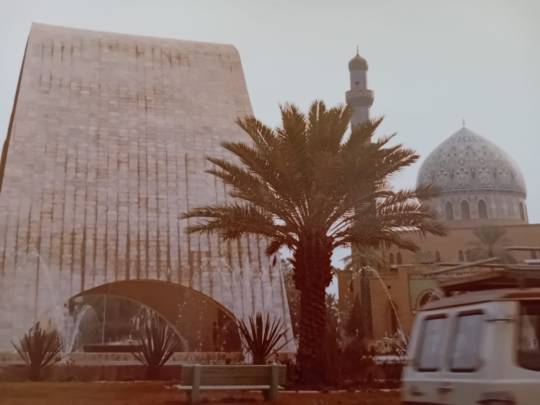
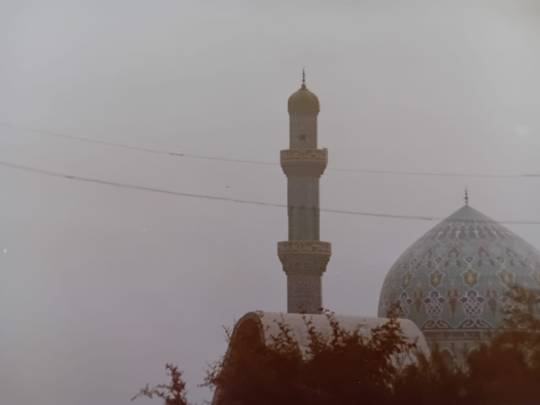
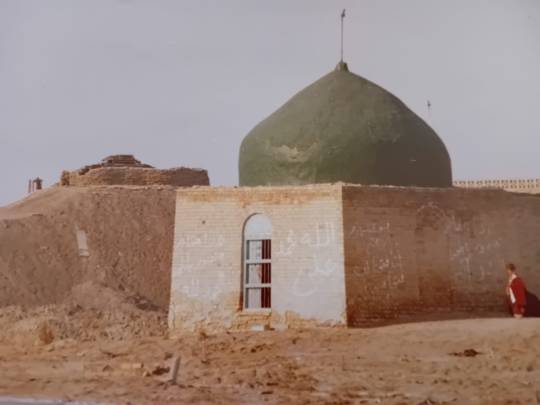
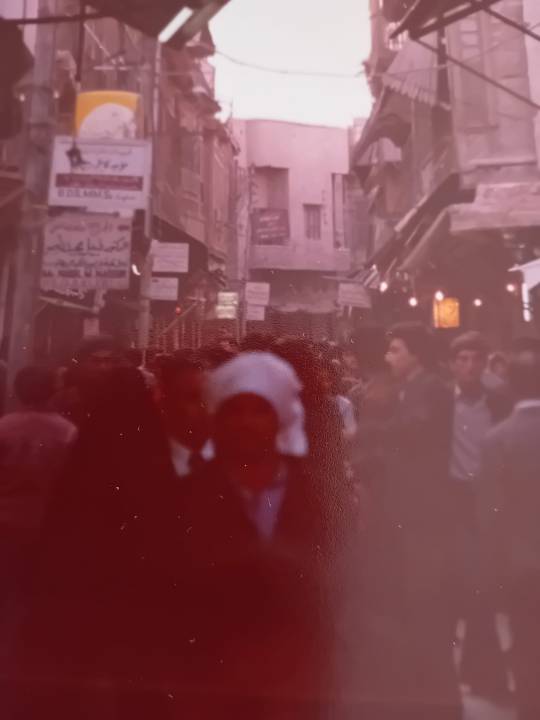
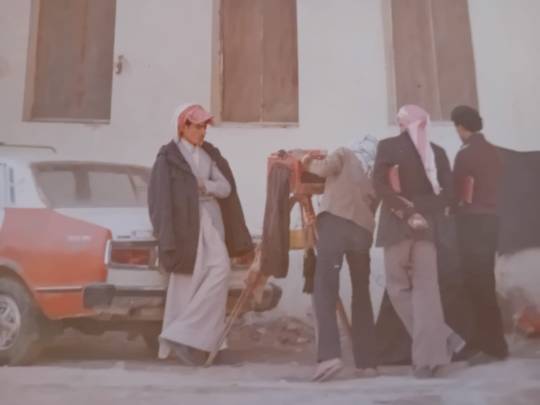
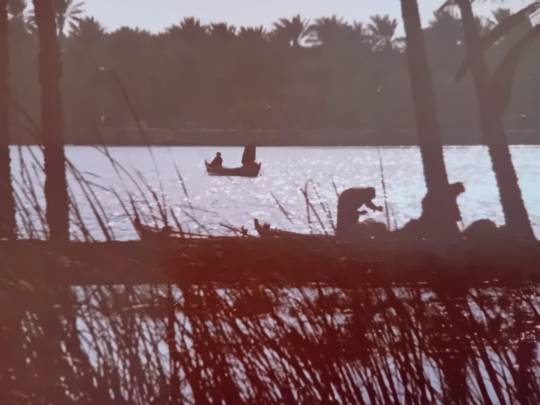

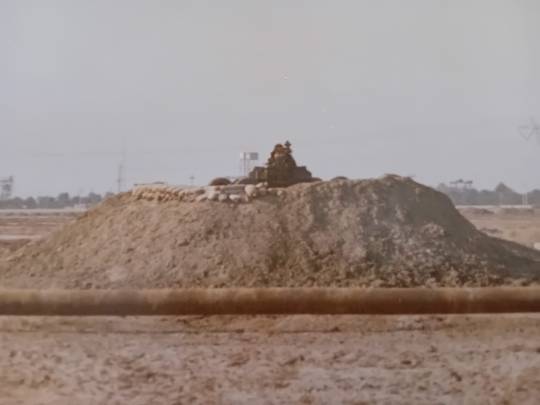
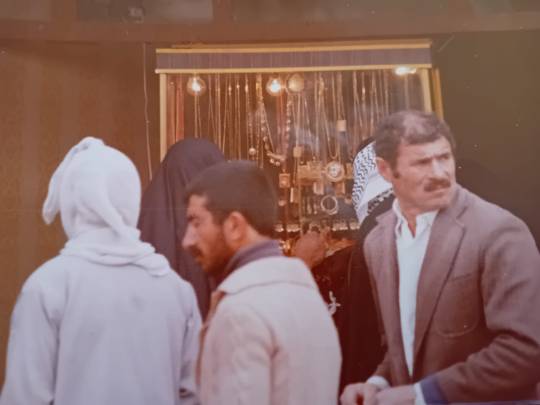

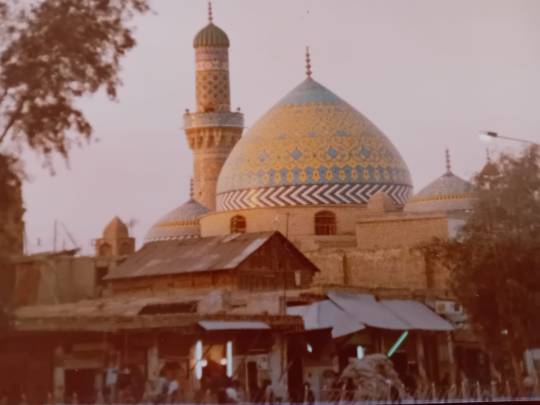
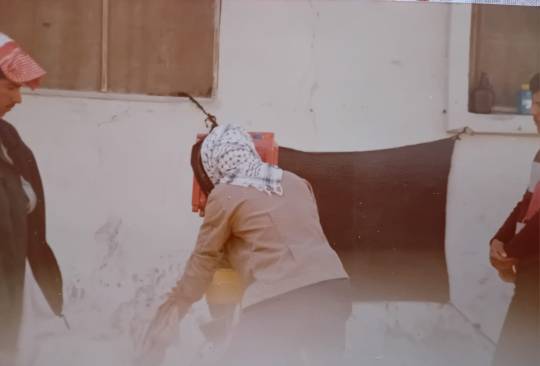
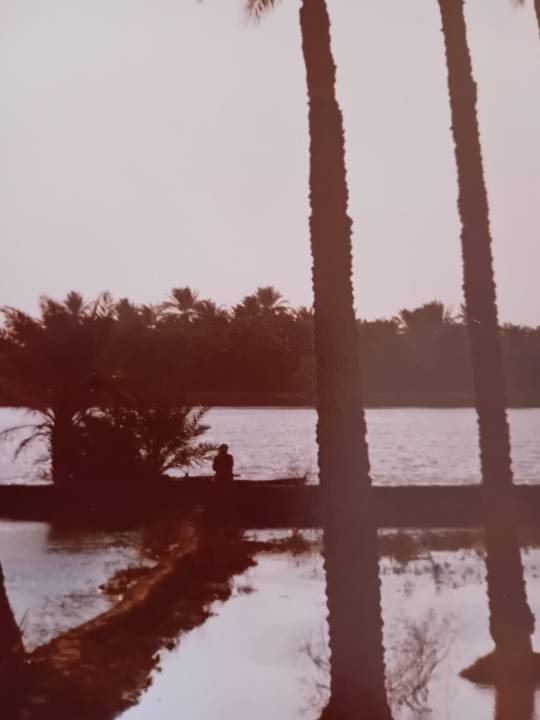
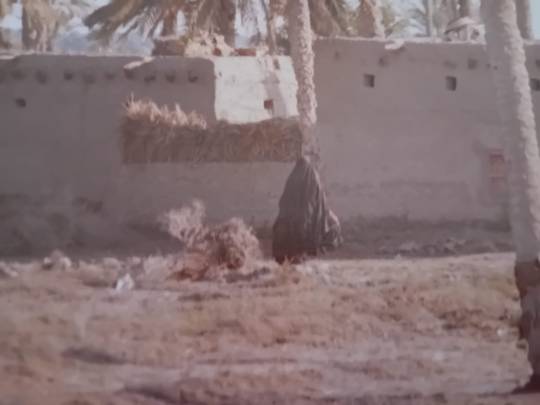
Some photos of Iraq I've taken on 1983. We can recognize Baghdad, - Nassiryah - Ur - Euphrates river.
IRAQ 1983 In January 1983 I was then informed that my new destination would be Nasiryah, Iraq. I left for Rome, and then in Fiumicino - late in the afternoon - I boarded an old Boing 707 of IRAQI Airways, the only company still serving Baghdad: the war with Iran was underway, and the international airlines had suspended flights to Iraq. Baghdad airport was only open at night, so we landed with the lights off, and when we began the descent towards the landing strip we were ordered to darken the windows. Having completed the customs and immigration procedures quite quickly (considering the fact of being in an Arab country and in a state of war) I went out into the deserted hall, where I easily saw the sign with my name hoisted by a local driver. He took me to a hotel on Sadoun street, in a ghostly Baghdad: all the lights were off, very few vehicles were circulating, security forces checkpoints at every intersection.
DEPARTURE FOR NASSIRYAH The next day the Project Manager – a tall, lanky Italian, with an unkempt beard – came to pick me up at the hotel. He told me to pack my bags, we would leave for Nassiryah immediately by car, since domestic flights were suspended due to the war. Our destination was 380 km away from Baghdad, and the highway was damaged by the continuous passage of military vehicles heading South, to the border with Iran. Just outside Baghdad, we passed alongside a high earth barrier, a couple of kilometers long: inside, it was explained to me, the Tammuz nuclear plant, destroyed by an Israeli air force incursion in June 1981. The journey was monotonous, and we only stopped once to refuel and eat shawarma. We arrived in Nasiryah in the late afternoon, and immediately checked into one of the two villas that VOLANI had rented for the expats. Here, towards the evening, I met my Italian colleagues: around ten people in total, which would soon be reduced to 5 given that the project was in the finishing phase.
THE PROJECT In essence it involved the rehabilitation of a plant for the production of electrical cables. When I arrived, in January 1983, the work was almost finished. All that was missing was the installation of a heavy overhead crane in the main warehouse, the completion of the new electrical system, the covering and infilling of some buildings. In consideration of the recent departures, and the fact that there were only 5 expatriates left, it was decided by the Management in Baghdad that we would leave one of the two rented villas, and concentrate on just one. I received the instruction from the Project Manager to rent couples of trailers locally, load the furniture and air conditioners owned by the Company present in villa No. 2, and ship everything to the warehouse in Baghdad. Having rented the trailers (far from a simple matter in a country in a state of war), they were accompanied to the villa and dismantling and loading operation began. I was at construction site, it was already a hot afternoon even though it was only the beginning of March, when I saw in distance a guy dressed in a Western style, jacket, white shirt and black tie. He was chatting with a local worker, who was nodding in my direction. When they got close, the guy – clearly a policeman – asked me:
Are you the boss here?
Yes – I replied – what do you need?
Come with me – he said in a tone that allowed no replies. I followed him in my pick up until we arrived in the parking lot of a low building, steel bars on the windows. The policeman motioned for me to follow him. We entered the building, there were cops everywhere, and photographs of bad guys sticked to the walls, with writings in Arabic indicating how much money the police would pay if information was given leading to their capture. I was taken to the office of the Commander, Mr. Abdul Karim Al Jalaani. The office was enormous, the Commander sat behind a large mahogany desk installed on a riser. I was made to sit on an Arab sofa, at the other end of the room, I was perhaps fifteen meters away from Major Al Jalaani. He looked at myself like you look at an insect, and then he said to me in English:
Are you the one who gave the order to vacate my villa that I rented there?
I organized the transport - I said - but the order left from Baghdad.
Good - he replied - I stopped the transport, come back here as soon as possible with your managers, the ones who gave you the order to vacate the house without my permission. Major's assistant, who had remained near the door, motioned for me to follow him. I went out into the street, breathing a sigh of relief: I had just entered and exited the headquarters of the so-called ''Mukabarat'' or Saddam Hussein's Secret Service, and I was still alive and in a good shapel! I went to the villa, and saw the trailers parked on the corner of the street - the watchman came to meet me:
Sir - he told me - we were loading the furniture, when a car with some policemen arrived - they stopped us and then asked what we were doing - I said that we were loading our furniture to send it to Baghdad - they ordered us to stop and they said:
''If one of these trucks dares to move we will arrest everyone''
Understood Sir?? We couldn't disobey, Sir – these people don't joke!
I understand, I understand, don't worry.
I went to the Central Post Office, I absolutely had to call the Baghdad office. In the old post office, a building with broken glass, dirty and with peeling walls, there was no one except the employees. I was able to get through the Baghdad office pretty quickly. I explained to the PM what had happened - he tried to reassure me, and I told him that I wasn't worried at all.
Be sure - he said - tomorrow evening I will be in Nassiryah and we'll solve the problem.'' And so it was: in the evening the Project Manager arrived at the villa, accompanied by the head of our security service, a tall and large Iraqi, who had been a comrade in arms of the Major of Nassiryah Mukabarat. The next morning at 10.00 we were in the mega office of Major Al Jalaani. The meeting between the former comrades was warm: kisses on the cheeks, hugs, pats on the back, questions about the health of the family members, and then more hugs and then questions about the health of the family members all over again……Then we sat down on the usual sofa at 15 meters from the Major's desk, while the two old friends went on talking about old times, they exchanged phrases of which the PM and I understood nothing, and then burst into resounding laughter. All this for more than half an hour, then our Head of Security said, as if by chance:
Ahh sorry…Abdul Karim……by the way …I came to see you after so many years yes…but also for that stupid matter of the rented villa…you know…the one we want to leave…you know?
Abdul Karim as if falling from the clouds: ''Ah yes yes… I was informed by one of my collaborators that there were trailers ready to take away the furniture… but this is not done my friend… you should have warned, right?
You are perfectly right akooya (brother) but you know these Westerners don't always know what our customs are, so I ask you as the brother you are, to forgive them from the height of your goodness that everyone recognizes in you (How could he be the head of the Secret Services and being ''good'' no one has ever explained it to me)
Sure, sure - replied Abdul Karim - but you agree that there are conditions to be respected so that everything can be settled, right?
Of course akooya – said our Chief of Security.
Well - the Commander continued - come closer and I'll tell you what these conditions are (I didn't understand this, they could have continued to speak to each other ''remotely'' in Arabic, given that neither I nor the PM understood what they said to each other when they spoke their language)
The Head of Security sat down on a chair immediately prepared by the Major's attendent, and so began a dense exchange of sentences, which our friend only interspersed with ''naam…naam'' (yes…yes) Then it all ended, we got up and with big bows, touching our hearts with our right hand as a sign of ''how good of you to receive us and you didn't even let us get whipped'' we left the police station. In the car, our Head of Security informed us of the ''conditions'' posed by the Major to ''forget'' the nasty rudeness we had tried to do to him, taking away OUR furniture and OUR air conditioners from his villa, where we paid 6,000 USD /month rent + all expenses, including security. (We suspected that it was the watchman who alerted the police that the trailers had arrived for the move). Well for 4 additional months in cash, the complete re-painting of the house (exterior/interior/surrounding wall) and OUR air conditioners, the Commander would have forgiven our ''offence''. The PM muttered "WTF......" but we had to put on a good face because there were no alternatives. The next day - once all the furniture had been loaded onto the trailers - the painting work began, under the supervision of an Al Jalaani representative.
6 notes
·
View notes
Text
We have had three reasons why the United States should treat questions related to military aid for Ukraine with far more urgency than it has thus far:
They need it.
They deserve it.
The wolf is at the door.
Now we see that the wolves are at the door, and Iran beat the Russians to it. Israel left the door unlocked. Iran has no trouble equipping its allies - Hamas, Hezbollah, Houthis - with the arms they need, for whatever missions these militias need to undertake. The United States' willingness to supply its allies with arms they need, when they need them, could not be more stark.
Why did it look like we sat back in the bleacher seats when Russia moved into Crimea in 2014? Because that's exactly the role we imagined for ourselves: spectators. Did anyone in the Obama White House imagine what we would do when Russia came back for seconds only a year later, where they attacked in eastern Ukraine in 2015? Did anyone in the Biden White House imagine what we ought to do in February 2022, when Russia came back for thirds after a two-month mobilization?
Apparently not. The best Washington could do was offer Ukraine's President Zelensky a flight out of Kyiv before the Russian army captured him. I wonder what Franklin Roosevelt would have thought if Winston Churchill had offered to ferry him out to London after Emperor Hirohito attacked Pearl Harbor? The United States had no strategy to help Ukraine win the war when it started in 1922, and it still does not.
The lack of a plan after two years - ten years if you count from 2014 - is still inexplicable to me. For every proposal that we gear our military aid to a strategy for victory, we utter the same response: we do not want to escalate. Yet Moscow escalates at will, with more and more strikes at civilian and military targets each month. Ukrainian leaders are at a loss to persuade its allies - and potential allies - that escalation, however you define it, is not an issue for them. It has the same goals that every other sovereign nation has: to live in peace within secure borders.
The United States has laid down many billions of dollars in aid at this point, with no plan to reach that goal. The only goal in sight appears to be the status quo: to maintain the current balance of military forces until both sides feel ready to negotiate based on -- the current balance of military forces. No wonder Ukraine wants to increase the capacities of its domestic armaments industries. No country among Ukraine's allies appears to want to help Ukraine win the war.
3 notes
·
View notes
Text
IranAir diverts flights to Istanbul to avoid EU sanctions
IranAir introduced a daily diversion between Tehran and Istanbul to fulfil its pre-booking obligations for flights to the EU, UK and Turkey, according to Arab media.
The move will provide an alternative to passengers affected by the airline’s suspension of all European routes under a yet-to-be-announced codeshare agreement with Turkish Airlines from their hub at Istanbul Airport.
The Turkish carrier would catch the flights that IranAir lost when passengers were transferred to London, Frankfurt and Paris. IranAir spokesperson Hessam Qorbanali said the daily service aimed to ease concerns of travellers affected by the EU sanctions and to ensure continuous links to Europe.
Alireza Manzari, Iran’s former representative to the International Civil Aviation Organisation (ICAO), stated that sanctions raised the cost of travel significantly. Flights to Europe became at least 30 per cent more expensive due to the lack of direct flights, resulting in the need for more expensive connecting flights, Manzari added.
IranAir suspended its European flights on 15 October following EU sanctions imposed on IranAir, Mahan Air and Saha Airlines. The sanctions caused logistical difficulties, including the refusal of European airports to refuel Iranian aircraft, forcing the carriers to make costly adjustments.
Maqsoud Asadi Samani, Secretary of the Association of Iranian Airlines, said IranAir was the last domestic carrier to offer services to Europe before the suspension took effect.
Read more HERE

#world news#news#world politics#iran air#europe#european news#eu politics#european union#eu news#eu sanctions#iran#iran news#turkey
0 notes
Text

Letsvisitpersia offers small group tours, budget tours, guided tours, private tours, and customized tours based on your request.
#Iran trip#letsvisitpersia#Iran tour#Iran budget tour#Iran group tour#Iran domestic flight#Shiraz tour#Yazd tour#Isfahan tour
1 note
·
View note
Text
The Blue Line that separates Israel and Lebanon is one of the most volatile borders in the world. Whenever the rhetoric between Israel and Iran escalates, or even when shepherds on either side cross over, anxieties of another conflict between Israel and Lebanon heighten. Conventional wisdom dictates that the mildest of confrontations on the border could provoke an all-out war.
But for the first time in a long while the fear of such a war is palpable. The Lebanese have started to stock up on basic necessities and are buying food, fuel, and diapers in bulk. Some Western countries have put their forces on alert to be ready to carry out evacuations, and more have called on citizens to leave the country while some commercial flights are still available.
There was chaos last week at Beirut-Rafic Hariri airport, the only international airport in the country, which was bombed in the last Israel-Hezbollah conflict in 2006. Israeli fighter jets have been flying low in Lebanese airspace, breaking the sound barrier and smashing windows, while an Israeli drone blares out an Arabic message calling on residents in Bint Jbeil, a town in southern Lebanon, to turn against Hezbollah.
Everyone in Lebanon agrees that the likelihood of a full-blown war with Israel is higher than any time since 2006. But if Israel’s goal is lasting deterrence of Hezbollah, a war may not be its best available strategy.
Some argue that the status quo with Hezbollah before Oct. 7, 2023, may have been the best-case scenario for Israel. The border had been mostly quiet since the 2006 war. Meanwhile, opposition to Hezbollah inside Lebanon was growing, as its alliance with Iran irked the influential Saudi Crown Prince Mohammad bin Salman—Saudis are big investors in Lebanon—and the Beirut port blast angered the public.
One strategy the Israelis are now mulling is to keep any assaults limited to Hezbollah-dominated areas of southern Lebanon, a suburb of Beirut, and the Beqaa valley. This would further disrupt Lebanon’s already crumbling economy, but the main strategic goal would be to push the group’s Shia supporters into other areas of the sect-based country and thus increase social tensions. Israelis believe this could deter Hezbollah domestically. “I feel concerned about the Shias,” said Eran Lerman, former deputy national security adviser of Israel. “A lot of people have scores to settle with Hezbollah since the Beirut blast or since the killings of Sunnis in the Syrian war.”
He said that Israelis have nothing against the Lebanese people and even if a full-scale war unfolds, Israel will try “not to attack Lebanese infrastructure, and look for people we can work with on the ground,” he said in reference to anti-Hezbollah players in the country.
Over the last few years—as Lebanon’s currency plummeted, the country plunged into an economic crisis, and a port blast killed more than 200 people—opposition to Hezbollah has become more vocal, even among a section of the Shias. But there are no clear numbers, and some analysts believe that it is uncertain how the Lebanese will react when confronted with the Israeli enemy. Israel’s strategy to bank on domestic opposition and look for local allies may work, or it may not if Lebanese rally behind the group in national solidarity.
However, the biggest reason unaligned Lebanese can’t revolt against Hezbollah is the fact that the group is armed to the teeth and has a committed army of supporters.
During the Beirut protests, people found the courage to add Hezbollah’s name and the image of its leader Hassan Nasrallah on the same posters where they condemned other politicians for being ineffective and culpable. Hezbollah responded without hesitation. Hundreds of young Hezbollah supporters carried out bike rallies in downtown in a show of strength and conveying a message of what could erupt on streets if Hezbollah felt threatened.
The Lebanese Forces, a dominantly Christian political group that was once a militia and continues to be Hezbollah’s chief political adversary in Lebanon, is treading cautiously. Georges Okais, a Lebanese lawmaker with the group, ruled out a civil war. “Only Hezbollah is armed,” he said. “There’s no war between unequal sides.”
It’s not that all Lebanese back Hezbollah, but that they can’t yet afford to take the group on. If Israel wants to create suitable conditions for the group to be demolished by fellow Lebanese, it first needs to figure out what to do with Hezbollah’s weapons and followers and how not to go overboard in a way that has the opposite effect on its campaign. That’s a tall order. In times of war, it is unlikely that all pieces fall in place perfectly for Israel to achieve its goals.
Furthermore, Hezbollah isn’t just a group of a few thousand fighters. It is part of a community that sees the group as its defender and expresses faith in its chief, Hassan Nasrallah. The group enjoys the support of most people in Lebanon’s Shia Islam community (although not all) and others may side with it if Israel launches a full-scale invasion of Lebanon.
“The Sunnis opposed Hezbollah when the group fought on the side of [Syrian President] Bashar al-Assad who was killing Sunni rebels; but now they back Hezbollah, which is helping Hamas, which is Sunni, and Gaza, which is Sunni,” Sami Nader, a Lebanese political analyst, added.
While Hezbollah may have anywhere between 20,000 fighters, as some analysts have argued, and 100,000, as Nasrallah has claimed, it has many more supporters spread all over Lebanon.
Hezbollah’s network of support and spies is extensive. Its functioning is highly secretive. Most Hezbollah fighters lead normal lives, have day jobs, are committed to offer their services when called upon, and are discreet enough to hide their identities. Since it is hard to identify Hezbollah fighters, Israel wouldn’t know how to distinguish them from civilians even if it invaded.
In 2020, when I received a tip-off about the location of Hezbollah’s weapons stockpiles, I found myself in a visibly Shia village on the Lebanon-Syria border. The walls were plastered with photos of Hezbollah fighters who had died in the Syrian conflict, posters of Iran’s ayatollahs, and of Qasem Soleimani—the leader of the Quds Force branch of the Iranian Revolutionary Guard Corps who was assassinated in Baghdad in a U.S. strike.
It was a simple village with concrete homes, shops selling flour, sugar and candy. As I stopped to take a break and engaged in what I thought to be a casual conversation with a local farmer, he seemed to quiz me.
After he let me go, a farm vehicle chased my car and blocked my path. The driver, dressed in a dirty yellow shirt and wearing a cap, gave me a good look, asked me who I was, interrogated me a little longer, and asked to see my passport before he gestured I could be on my way.
However, that’s not where the adventure ended.
Two days later I received a call from Lebanon’s general security department. I was called in for an interrogation, and after several hours of questioning, I was let go with a warning to not wander around too much. It was an indication of how deep Hezbollah’s support network runs in Lebanon, how its fighters are residing amid unarmed civilians, and how it operates under the cover of state agencies.
If Israel carpet bombs Hezbollah-dominated areas, there will be a massive loss of life; and yet it cannot control these areas unless it occupies Lebanon, which will almost certainly lead to an indeterminable long war and strikes deep within Israel.
Hezbollah is not a group of people wearing uniforms or wielding arms but a community inhabiting entire villages, neighborhoods, and cities. Will Israel eliminate entire populations to defeat its adversary? And will that bring it safety or an extended conflict?
Elias Farhat, a former general of the Lebanese Army, said that while there was no doubt that Israel is militarily stronger with a conventional army and weapons, “Hezbollah resorts to asymmetric warfare.”
“It deploys its units in hideouts, tunnels, and caves with no appearances,” he said, implying that Israel wouldn’t know who the enemy is. “A full-scale invasion allows Hezbollah to cause heavy damages in the heart of Israel between Tel Aviv, Haifa, and Jerusalem. … We don’t rule out an advance of Hezbollah in Galilee.”
Lerman said Israel was aware of the costs but if Hezbollah did not back off—which would mean stopping attacks on Israel and withdrawing to the Litani River as agreed upon in U.N. Security Council Resolution 1701—Israel would be forced to carry out an assault.
Israelis are in a tight spot. They can perhaps weaken Hezbollah if they attack, but they cannot defeat it definitively. On the other hand, Hezbollah’s insistence to stay put on the Blue Line with missiles aimed at Israel is a constant source of tension and anxiety among the Israeli people.
But Hezbollah has also measured its response—partly because it understands that Israel has much more fire power, but mainly because the Lebanese people do not want a war. It has said that the group doesn’t want a “total war” and that it would only invade northern Israel “in the context of any war imposed on Lebanon,.” Even Hezbollah needs some legitimacy to operate in Lebanon, and staying in control of the country is the biggest prize for both Hezbollah and its patron Iran.
However, Hezbollah has continued its limited attacks against Israel and has vowed to keep going unless there is a ceasefire in Gaza.
There is one way out of the mess: politics. By starting peace talks with the Palestinians and resolving that dispute, Israel could deny its raison d’être, and two existential problems will be solved at once.
2 notes
·
View notes
Text
Friday, January 19, 2024
Snow, chilly winds in Vancouver shut schools, hinder air traffic (Reuters) Schools remained shut and flights were impacted in Vancouver on Wednesday as weather forecasters warned of heavy snowfall and frigid winds sweeping across the Pacific Coast Canadian city. Western Canada is emerging from a blast of arctic temperatures over the weekend, and while temperatures have risen from the minus 9 degrees Celsius (16 degrees Fahrenheit) recorded on Sunday, federal meteorologists forecast 10 to 15 centimeters (4-6 inches) of snow and a wind chill of minus 7 degrees Celsius on Wednesday.
Why the World Is Betting Against American Democracy (Politico magazine) When I asked the European ambassador to talk to me about America’s deepening partisan divide, I expected a polite brushoff at best. Foreign diplomats are usually loath to discuss domestic U.S. politics. Instead, the ambassador unloaded for an hour, warning that America’s poisonous politics are hurting its security, its economy, its friends and its standing as a pillar of democracy and global stability. The U.S. is a “fat buffalo trying to take a nap” as hungry wolves approach, the envoy mused. “I can hear those Champagne bottle corks popping in Moscow—like it’s Christmas every ... day.” Some of the diplomats stressed they admire America—some attended college here. They acknowledged they don’t have some magical solution to the forces deepening its political polarization. But they’re worried today’s U.S. political divisions could have lasting impact on an increasingly interconnected world. A former Asian ambassador said, “We’ve gone from a unipolar world that we’re familiar with from the 1990s into a multipolar world, but the key pole is still the United States. And if that key pole is not playing the role that we want the U.S. to do, you’ll see alternative forces coming up.”
Traffic through the Panama Canal is being slashed because of drought, disrupting global trade (AP) A severe drought that began last year has forced authorities to slash ship crossings by 36% in the Panama Canal, one of the world’s most important trade routes. The new cuts announced Wednesday by authorities in Panama are set to deal an even greater economic blow than previously expected. Canal administrators now estimate that dipping water levels could cost them between $500 million and $700 million in 2024, compared to previous estimates of $200 million. One of the most severe droughts to ever hit the Central American nation has stirred chaos in the 50-mile maritime route, causing a traffic jam of boats, casting doubts on the canal’s reliability for international shipping and raising concerns about its affect on global trade.
Royal surgeries (Washington Post) The British royal palaces made unusual back-to-back health announcements. Catherine, Princess of Wales and wife to the future British king, underwent “successful” abdominal surgery and would remain hospitalized for up to two weeks, Kensington Palace said, and probably would not resume her official duties before April. The palace did not offer additional details about what procedure was performed. Soon after, Buckingham Palace announced that Charles, 75, would undergo a “corrective procedure” next week for an enlarged prostate.
Pakistan launches retaliatory airstrikes in Iran after an earlier attack by Tehran (AP) Pakistan’s air force launched retaliatory airstrikes early Thursday in Iran allegedly targeting militant hideouts, an attack that killed at least nine people and further raised tensions between the neighboring nations. The tit-for-tat attacks Tuesday and Thursday appeared to target two Baluch militant groups with similar separatist goals on both sides of the Iran-Pakistan border. However, the two countries have accused each other of providing safe haven to the groups in their respective territories. The strikes imperil diplomatic relations between the two neighbors, as Iran and nuclear-armed Pakistan have long regarded each other with suspicion over militant attacks. Each nation also faces its own internal political pressures—and the strikes may in part be in response to that.
For many in China, the economy feels like it is in recession (Reuters) The night before China’s civil service exam, Melody Zhang anxiously paced up and down the corridor of her dormitory, rehearsing her answers. Zhang was hoping to start a career in state propaganda after more than 100 unsuccessful job applications in the media industry. With a record 2.6 million people going for 39,600 government jobs amid a youth unemployment crisis, she didn’t get through. “The endless job-hunting is a torture,” said the 24-year-old graduate from China’s top Renmin University. A crisis of confidence in the economy is deterring consumers from spending and businesses from hiring and investing, in what could become a self-feeding mechanism that erodes China’s long-term economic potential. China grew 5.2% last year, more than most major economies. But for the unemployed graduates, the property owners who feel poorer as their flats are losing value, and the workers earning less than the year before, the world’s second-largest economy feels like it’s shrinking.
UN: Palestinians are dying in hospitals as estimated 60,000 wounded overwhelm remaining doctors (AP) Palestinians are dying every day in Gaza’s overwhelmed remaining hospitals which can’t deal with the tens of thousands people hurt in Israeli’s military offensive, a U.N. health emergency expert said Wednesday, while a doctor with the International Rescue Committee called the situation in Gaza’s hospitals the most extreme she had ever seen. The two health professionals, who recently left Gaza after weeks working in hospitals there, described overwhelmed doctors trying to save the lives of thousands of wounded people amid collapsing hospitals that have turned into impromptu refugee camps. The World Health Organization’s Sean Casey, who left Gaza recently after five weeks of trying to get more staff and supplies to the territory’s 16 partially functioning hospitals, told a U.N. news conference that he saw “a really horrifying situation in the hospitals” as the health system collapsed day by day. The Health Ministry in Gaza estimates that 60,000 people have been wounded, with hundreds more wounded per day.
As famine looms in Gaza, aid delivery remains difficult and dangerous (Washington Post) Describing the humanitarian situation in the Gaza Strip in increasingly apocalyptic terms, aid agencies are urging Israel to ease the difficult and often dangerous process of delivering supplies to desperate Palestinians. Famine is looming in Gaza, the United Nations warns. The World Food Program estimates that 93 percent of the population faces crisis levels of hunger. Disease is spreading rapidly. The World Health Organization predicts that the death toll from sickness and starvation in coming months could eclipse the number of people killed in the war so far—more than 24,000, according to the latest count from the Gaza Health Ministry, with the majority women and children. Aid agencies say the chief factors hampering the delivery of lifesaving assistance to Gazans fall almost entirely under Israel’s control—the Israeli inspection process for aid remains lengthy and inefficient; there aren’t enough trucks or fuel inside Gaza to distribute the aid; mechanisms to protect humanitarian workers are unreliable; and commercial goods have only just begun to trickle in. Large swaths of Gaza remain off-limits to aid workers. Frequent telecommunications blackouts complicate their work. And the war still rages.
3 killed and 77 injured in a massive blast caused by explosives in a southern Nigerian city (AP) Three people died and 77 others were injured overnight when an explosives rocked more than 20 buildings in one of Nigeria’s largest cities, authorities said Wednesday, as rescue workers dug through the rubble in search of those feared trapped. Residents in the southwestern state of Oyo’s densely populated Ibadan city heard a loud blast at about 7:45 p.m. Tuesday, causing panic as many fled their homes. Preliminary investigations showed the blast was caused by explosives stored for use in illegal mining operations, Oyo Gov. Seyi Makinde told reporters after visiting the site in the Bodija area of Ibadan.
Tobacco use falling worldwide but Big Tobacco fighting to reverse trend, WHO says (CBS News) The number of adult tobacco users has dropped steadily in recent years, the World Health Organization said on Tuesday, but it warned Big Tobacco is working hard to reverse that trend. In 2022, about one-in-five adults around the world were smokers or consumed other tobacco products, compared to one-in-every-three in 2000, the United Nations health agency said. Currently, tobacco use is still estimated to kill more than eight million people each year, including an estimated 1.3 million non-smokers who are exposed to second-hand smoke, WHO statistics show. While celebrating the advances that have been made, the WHO warned that the tobacco industry was intent on rolling them back.
Satellites and our view of the skies (Nikkei Asia) There are approximately 9,000 satellites orbiting the world, 60 percent of which are communications satellites that have been launched since 2020. These comms satellites—5,600 of which are from SpaceX alone—fly rather low, and are reportedly causing issues with seeing space from Earth. This is an issue, as SpaceX plans to launch 42,000 satellites, a Chinese rival plans to launch 13,000, and kit and caboodle the major comms satellite players intend to toss 65,000 satellites into orbit.
0 notes
Text
On this day in Wikipedia: Sunday, 14th January
Welcome, velkommen, καλωσόρισμα (kalosórisma), benvingut 🤗 What does @Wikipedia say about 14th January through the years 🏛️📜🗓️?
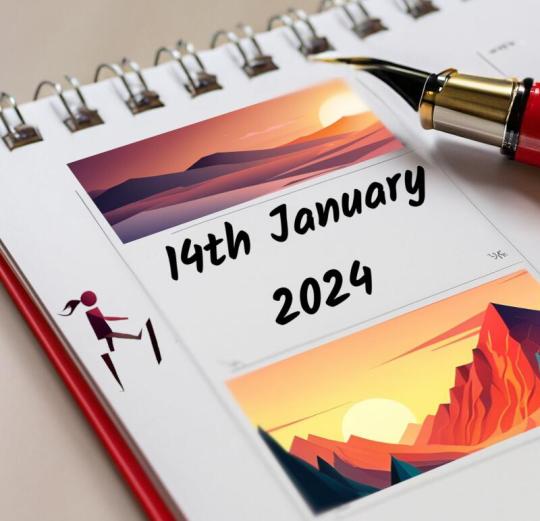
14th January 2023 🗓️ : Death - Mukarram Jah Mukarram Jah, 8th Nizam of Hyderabad (b. 1933) "Nizam Mir Barkat Ali Khan Siddiqi Mukarram Jah, Asaf Jah VIII (6 October 1933 – 15 January 2023), less formally known as Mukarram Jah, was the titular Nizam of Hyderabad between 1967 and 1971. He was the head of the House of Asaf Jah until his death in 2023. Born as the eldest son of Azam Jah and..."

Image licensed under CC BY 2.0? by Nagarjun Kandukuru from Bangalore, India
14th January 2019 🗓️ : Event - Saha Airlines A Saha Airlines Boeing 707 crashes at Fath Air Base near Karaj in Alborz Province, Iran, killing 15 people. "Saha Airlines (Persian: هواپیمایی ساها) is an Iranian airline based in Tehran that operates scheduled domestic flights...."
14th January 2014 🗓️ : Death - Jon Bing Jon Bing, Norwegian author, scholar, and academic (b. 1944) "Jon Bing (30 April 1944 – 14 January 2014) was a Norwegian writer and law professor at the Norwegian Research Center for Computers and Law (NRCCL), and the Faculty of Law at the University of Oslo. Bing was considered a pioneer in international IT and information law. He held honorary doctorates..."
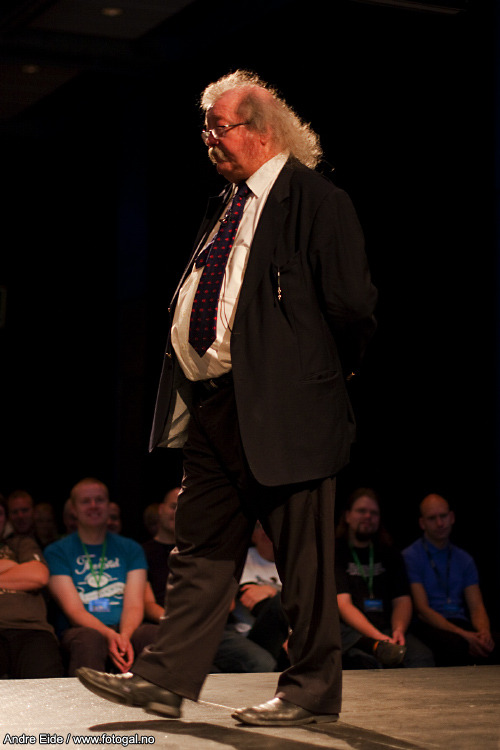
Image licensed under CC BY-SA 2.0? by Andre Eide from Norway
14th January 1974 🗓️ : Birth - Kevin Durand Kevin Durand, Canadian actor "Kevin Serge Durand (born January 14, 1974) is a Canadian actor. He is best known for portraying Vasiliy Fet in The Strain, Joshua in Dark Angel, Martin Keamy in Lost, Fred J. Dukes / The Blob in X-Men Origins: Wolverine, Barry Burton in Resident Evil: Retribution, Gabriel in Legion, Little John in..."

Image licensed under CC BY-SA 2.0? by Gage Skidmore
14th January 1924 🗓️ : Birth - Carole Cook Carole Cook, American actress and singer (d. 2023) "Mildred Frances Cook (January 14, 1924 – January 11, 2023), known professionally as Carole Cook, was an American actress, active on screen and stage, best known for appearances on Lucille Ball's comedy television series The Lucy Show and Here's Lucy. Her best known film roles include The Incredible..."

Image by State Library and Archives of Florida
14th January 1824 🗓️ : Birth - Vladimir Stasov Vladimir Stasov, Russian critic (d. 1906) "Vladimir Vasilievich Stasov (also Stassov; Russian: Влади́мир Васи́льевич Ста́сов; 14 January [O.S. 2 January] 1824 – 23 October [O.S. 10 October] 1906), was a Russian critic of music and art. Born into a wealthy, noble family, Stasov became a prominent figure in mid-19th-century Russian culture. He..."

Image by Ilya Repin
14th January 🗓️ : Holiday - Revolution and Youth Day (Tunisia) "This is a list of holidays in Tunisia. January 1: New Year's Day March 20: Independence Day April 9: Martyrs' Day May 1: Labour Day July 25: Republic Day August 13: Women's Day October 15: Evacuation Day December 17: Revolution Day Eid al-Fitr Eid al-Adha Islamic New Year Mawlid..."
0 notes
Text

Airbus A330-200 Iran Air
Registration: EP-IJA Type: 330-243E Engines: 2 × RR Trent 772C-60 Serial Number: 1540 First flight: Jun 2, 2014
The National Airline of Iran, branded as Iran Air, is the flag carrier of Iran, which is headquartered at Mehrabad Airport in Tehran. Iran Air's main bases are Imam Khomeini International Airport and Mehrabad International Airport, both serving Tehran, the capital of Iran. Domestically, Iran Air is commonly known as Homa, which is the name of a mythical Persian phoenix or griffin, and also the acronym of Iran National Airlines in the Persian language. Iranian Airways was founded in May 1944. The carrier became a full member of the International Air Transport Association (IATA) in 1964.
Poster for Aviators. aviaposter.com
1 note
·
View note
Text
hardcore wish it was still spring break bc being back on a schedule has made everything Incredibly Real + no longer a walking fever dream.. i am having a,, how do you say it.. a No Good Very Bad Time
#spent a good hour earlier having a panic attack bc the gravitas of the world's situation ran me over like a train#of course i've known things are serious for a while now. they've been serious since the virus was only in china but like.. fuck. idk.#reading about how iran's getting Fucked and the politics in all of that + the politics in america in relation to the virus + how biden is#still getting pushed as the dem nomination Despite bernie almost ditching his campaign to attend to it.. It's just a Lot#idk#i spent last week in a really weird spot. like i was reading about how arkansas was getting worse and worse but like gdhghd idk. like it was#spring break and week one of the quarantine so everything was really detached. school's back in session this week and i probably have to fly#home sunday which by itself is not a big deal But florida hasn't locked down and people from new york are flying to MCO and like. sure they#have to quarantine once they get to florida but even desantis is like yeah there's at least one case on most domestic flights rn!#like.. who knows what i'd be carrying home from ms. mco the international airport :D and like. my mom is over 50 + she's not immunocomprised#BUT i really don't think she would weather this too well and Also she's the main caregiver for my grandma + my grandma Would Not survive#this. she's like already on the edge yk? so it's just#hh#incredibly stressful. school is incredibly stressful. I've emailed my professors and like#idk if it's just the social climate in florida right now (although i'm sure it is because Nobody i'm friends w back home is fucking#isolating!! it feels like nobody is taking it seriously there!)#but they don't seem to grasp that 1. i am in quarantine 2. i have no way to access our materials because i left them in florida because i#was supposed to be home last week! so#fjdhsh#i want to rip out my hair#of course there are so many worse things going on + this is all miniscule complaining in the grand scheme of things but ykw we are all#entitled to vent our frustrations and anxieties so ; J ; w/e i suppose??#idk i'm just a melting pot of emotion rn + i hate to put this all here but my sister who IS immunocompromised can't really talk about this#kind of stuff anymore because it gives her Mad Anxiety + her body is like ooohh.. we shall now experience Symptoms#and i am Not tryna give her an asthma attack rn hahha#sriracha.txt#vent#coronavirus
2 notes
·
View notes
Text

New information and more delays in the Sukhoi Su-75 "Checkmate" program
Fernando Valduga By Fernando Valduga 01/12/23 - 21:07in Military
A new Su-75 mockup was presented by Sukhoi.
0
Views
Share on Facebook
Share on Twitter
With the North American Lockheed Martin F-35 Lightning II fighter has a considerable advantage in orders and Russia wants to try to regain the advantage, although the Su-75 "Checkmate" fighter program has not been able to advance as planned.
The Russian aeronautical industry is suffering the repercussions of the various embargoes decided by Americans, Europeans and also Japanese.
When it was presented at the MAKS fair in the summer of 2021, the aircraft aroused great enthusiasm from aeronautical enthusiasts and experts. A few weeks later, the UAC group, owner of Sukhoi in particular, presented him with great fanfare for the first time outside Russia.

From then on, it was no longer a mystery that this Sukhoi Su-75, also known as Checkmate, had been designed to allow Russia to reach its American and European competitors. It was also increasingly presented as the "non-aligned" alternative to the F-35A Lighting II. In fact, the Checkmate presented itself mainly as a supposedly stealth attack fighter, probably of the 5th generation, intended mainly for emerging nations of Africa, Southeast Asia and the Middle East. Even the Russian domestic market did not seem to be a priority for him, except perhaps in the context of replacing older aircraft, such as the Soviet-era Mikoyan MiG-29 Fulcrum and the Sukhoi Su-25 Frogfoot.
The future seemed bright for the fighter, until February 24, 2022, when Russian President Vladimir Putin decided to invade neighboring Ukraine under false pretexts. Soon after, European countries, the United States and other allies, such as Australia, Canada, South Korea and Japan, quickly decided on a series of economic sanctions against the Russian president, his relatives and Russian companies. The UAC was obviously part of this "package", since aircraft manufactured by Sukhoi bombed Ukrainian civilians.

Proposal for an unmanned version of Checkmate.
Meanwhile, China and India counted the points while some allied nations of Moscow, especially in Asia Minor and sub-Saharan Africa, gave strong support to Putin and his troops... while continuing to accept the thousands of dollars and euros in international aid.
Before the middle of last year, the Sukhoi Su-75 program already suffered from some delays in all areas. However, in Russia it still seemed to believe in a first flight of the prototype for the end of this year, preceded by a few weeks of continuous testing.
The UAC yesterday, without ever uttering words or expressions of "economic restrictions", "embargo" or even "Ukraine", reported that it decided to postpone the taxi tests and the inaugural flight of the aircraft for a period that goes from the fourth quarter of 2024 to the first quarter of 2025. As a result, the first pre-series aircraft should not appear between 12 and 15 months after this first flight. Similarly, UAC personnel said nothing about the withdrawal of the financing of the Emirates, resulting from American and European diplomatic pressure.
Along with the press release, a new full-scale model of the plane was presented. The Sukhoi Su-75 "Checkmate" will have a new generation NPO Saturn Izdeliye 30 turbojet engine with future evolutions of the Su-57 Felon. Like the latter, the plane was designed taking into account the evolution of the radar signature. Like any good stealth aircraft, the Su-75 will have weapons in an internal compartment, but also hardpoints under the wings for a maximum combat load of 7300 to 7400 kg. The weaponry will initially consist only of Russian ammunition, and foreign equipment from China and/or Iran can then be added.
The UAC indirectly indicated that the aircraft will be equipped with an active matrix radar, allowing it to engage up to six targets at the same time, along with a front optor. It will also be optimized to be able to be connected in flight with Loyal Wingman drones.

Apparently, Moscow still wants to believe in its future plane. And the Russians are right because between a Sukhoi Su-57 Felon who has been fighting for years and an increasingly distant future and hypothetical Mikoyan MiG-41, the greatness of the Soviet years seems to have been left behind. And now China must overtake Russia quickly thanks to planes like the Chengdu J-20 and the Shenyang J-31.
Tags: Military AviationCheckmateRussiaSu-75sukhoiUAC - United Aircraft Corporation
Sharing
tweet
Pin
Fernando Valduga
Fernando Valduga
Aviation photographer and pilot since 1992, he has participated in several events and air operations, such as Cruzex, AirVenture, Dayton Airshow and FIDAE. He has works published in specialized aviation magazines in Brazil and abroad. Uses Canon equipment during his photographic work in the world of aviation.
Related news
WAR ZONES
NATO will deploy E-3 AWACS aircraft in Romania
13/01/2023 - 19:05
COMMERCIAL
Rossiya Airlines performs the first Check-C on a Superjet 100 aircraft
13/01/2023 - 17:00
Three C-130Hs from Niger, with registrations 5U-MTU, 5U-MMS, 5U-MBH, seen during the inauguration ceremony.
MILITARY
Niger Air Force introduces the third C-130Hs in service
13/01/2023 - 16:00
MILITARY
Libya acquires Hürkus-C turbolice from TAI
13/01/2023 - 13:00
MILITARY
French Defense Acquisition Agency will evaluate Airbus and Dassault for future maritime patrol aircraft
13/01/2023 - 12:00
MILITARY
RUSSIA - IRAN: Missiles and UAVs in exchange for Su-35 aircraft
13/01/2023 - 08:23
Cavok Twitter
homeMain PageEditorialsINFORMATIONeventsCooperateSpecialitiesadvertiseabout
Cavok Brazil - Digital Tchê Web Creation
Commercial
Executive
Helicopters
HISTORY
Military
Brazilian Air Force
Space
Specialities
Cavok Brazil - Digital Tchê Web Creation
1 note
·
View note
Text
Travel to Iran, a destination that is not similar to any of your previous destinations.
2 notes
·
View notes